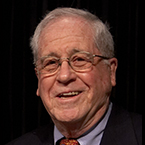
A native of Pittsburgh, Pennsylvania, Fisher was born August 23, 1918. He earned a bachelor’s degree and his medical degree from the University of Pittsburgh (Pitt). He began his career as a faculty member at Pitt, and in 1953, founded the university’s Laboratory of Surgical Research. At the time of his death, he served as a distinguished professor of surgery at the University of Pittsburgh Medical Center.
Fisher conducted groundbreaking research on breast cancer, resulting in significant improvements in the treatment and management of the disease. In the 1960s, he put forth the concept that solid tumors such as breast cancer are likely to be systemic at the time of diagnosis and represent potential metastases during the life of the host.In 1967, he became chair of the Surgical Adjuvant Chemotherapy Breast Project, which would later be known as the National Surgical Adjuvant Breast and Bowel Project (NSABP). Studies he conducted at NSABP helped end the practice of radical mastectomy, a major surgery that removed the breast, chest wall muscle, and lymph nodes. First, a trial conducted by the NSABP in 1971 showed that a total mastectomy was as effective as a radical mastectomy. Later, a long-term study showed that lumpectomy preserved the breast with no deleterious effect on either distant disease-free survival or overall survival. This less invasive surgical procedure has allowed many women with breast cancer to survive their disease with a higher quality of life.
Fisher became a member of the AACR in 1961. He served on the AACR Board of Directors from 1988 to 1991. He won the AACR-Joseph N. Burchenal Clinical Research Award in 1998, and the AACR Lifetime Achievement Award in Cancer Research in 2006. In 2013, he was a member of the inaugural class of Fellows of the AACR Academy.
Fisher held numerous national positions of leadership. From 1979 to 1982, he served on the President’s Cancer Panel, appointed by President Carter. From 1986 to 1992, he served on the National Cancer Advisory Board, appointed by President Reagan. He was an elected member of the Institute of Medicine and an Elected Fellow of the American Association for the Advancement of Science.
He served as president of the American Society of Clinical Oncology (ASCO) for the 1992-1993 term, and in 2014, the organization honored him as a 50th Anniversary “Oncology Luminary.”
Among many other career awards, Fisher was recognized with the Albert Lasker Clinical Research Award in 1985, the Medal of Honor from the American Cancer Society in 1986, the Brinker Award for Scientific Distinction from the Susan G. Komen Foundation in 1992, the Charles Kettering Prize from the General Motors Cancer Research Foundation in 1993, the Bristol-Myers Squibb Award in 1993, the American Surgical Association Medallion for Scientific Achievement in 2000, the Distinguished Medical Science Award from the Friends of the National Library of Medicine in 2007, and the OncLive “Giants of Cancer Care” Inaugural Award in 2013. In 2018, he received the Society of Surgical Oncology Charles M. Balch, MD Distinguished Service Award.
”Bernard Fisher was an icon in the field of cancer medicine. His pioneering research established new paradigms in our understanding of breast cancer and revolutionized the treatment of this devastating disease. His exceptional contributions, which were recognized by two prestigious AACR awards,improved survival and quality of life for countless women diagnosed with breast cancer around the world. He will be sorely missed by all of us in the field,” said Margaret Foti, PhD, MD (hc), chief executive officer of the AACR.
Be the first to add a Remembrance.